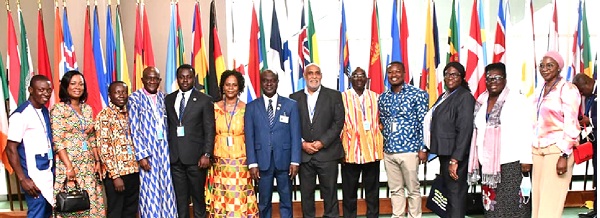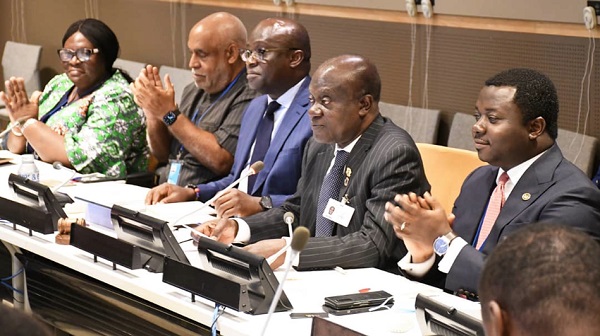
Looking back for SDGs acceleration: Lessons from Ghana’s Second Voluntary National Review
The principle of sustainable development, the interconnection of economy, society and environment, remains the key element underlying the work of the United Nations in Ghana.
The big question is how is our work going to support Ghana’s transformation in such a way that the successes achieved today benefit all Ghanaians without compromising the ability of future generations to meet their own needs?
Advertisement
The Agenda 2030 and its 17 goals, the yardstick by which development progress is measured, gives us reason to pursue harder the goal of achieving our development agenda.
Measuring progress through regular and inclusive reviews in preparation for the Voluntary National Review (VNR) also offers a chance to evaluate, assess and recalibrate.
Held annually in New York during the annual session of the High-Level Political Forum on Sustainable Development, the VNR provides an opportunity for countries to share their experiences implementing the SDGs. It also seeks to strengthen government’s policies and institutions and to mobilise multi-stakeholder support and partnership for SDGs implementation.
Participating countries
In July this year, 45 countries, including Ghana, presented its VNR in New York. Led by the National Development Planning Commission, Ghana’s VNR preparation was consultative and participatory, involving the government of Ghana ministries, departments and agencies, civil society organisations (including representation of youth, women, children and persons living with disabilities), the private sector, UN agencies and a host of development partners.

The UN in Ghana actively supported the 2022 VNR process through technical, coordination and financial assistance. The UN further accompanied Ghana to the HLPF to give support to its VNR Lab held on the side of the HLPF to facilitate experience sharing and deliberate on opportunities for mobilising resources and fostering partnerships to accelerate implementation of the SDGs as well as showcase how Voluntary Local Reviews have been used in the VNR processes.
Review
The review shows that Ghana has made some gains since its last report in 2019 as shown during a virtual exhibition supported by the UN in Ghana.
For instance, there has been an increased in registration level of school enrolment in kindergarten, primary, and secondary schools, resulting in over 80 per cent enrolment and gender parity.
The population participating in formal and informal education, and training has gone up. There has also been improved outcomes in tackling maternal mortality, obesity among children, women’s participation in parliament and local government, access to improved drinking water services and electricity; illegal, unreported and unregulated (IUU) fishing, financial inclusion and proportion of unsentenced detainees.
Like many other countries, progress of SDG implementation has been mixed.
These have been driven by COVID-19 impacts as well as global conflicts, which are estimated to cause a rise or fall back in poverty of some 25 per cent of the Ghanaian populace.
This is coupled with the current low coverage of social protection, generally high food inflation, high unemployment rate among PWDs and youth, as well as disparities in access to basic services such as health, sanitation and nutrition. Improvement in the macroeconomic environment recorded in the 2019 report has been derailed as a result of the pandemic, and we have seen the single-digit inflation grow into double-digit leading to an upward trend in interest rates and the budget deficit.
Highlights
The highlights of the report call for the need for Ghana to restore and transform its economy to create opportunities for all, especially young people; broaden social protection coverage for vulnerable groups, including persons with disability, to enhance social inclusion; strengthen innovative financing and resource mobilisation through expanded multistakeholder partnerships and an integrated national financing framework as well as harnessing emerging opportunities such as the Africa Continental Free Trade Area.
In addition, Ghana will need to address infrastructure deficits in key sectors such as health, education and sanitation services; deepen the national digitalisation drive, and mitigate the impacts of climate change and variability for green growth. The findings of this 2022 VNR clearly demonstrate the need to redouble efforts in order to bring about critical socio-economic transformations and fulfil the transformative promise of the SDGs to “leave no one behind”.
Reviewing and reflecting on the SDGs implementation, consulting various groups, stakeholders and partners in the process present a window of opportunity for further inclusive engagement and investment to build forward better towards achieving self-reliance and the SDGs.
We commend the government and people of Ghana for their resolve to pursue a forward-looking approach to implement and attain the SDGs, despite the many global challenges engulfing every aspect of our development efforts.
The UN is committed to supporting the government of Ghana and other stakeholders in taking forward the recommendations and embedding the key learnings and opportunities arising from the 2022 VNR in our next United Nations Sustainable Development Cooperation Framework (UNSDCF).
SDGs
The UNSDCF will reflect the government’s expectations of the UN and drive the UN Country Team’s joint response and contributions to national development priorities and SDGs, as well as strengthen and expand multi-stakeholder partnerships critical to achieving the SDGs.

Our collective vision is to see a Ghana that is independent, self-reliant and resilient where all Ghanaians have equal access to basic services, their rights are protected and they enjoy a stake in the country’s prosperity and growth.
Ghana’s second VNR presentation is an indication of the country’s preparedness to accelerate SDGs implementation. Now is the time for Ghana to ‘lead from the front’ through firm commitment and resources to implement the emerging recommendations from the consultative process.
The entire United Nations system in Ghana reaffirms its commitment to continue to support efforts towards achieving the SDGs, leaving no one behind and a Ghana Beyond Aid, where the present generation will benefit just as much as the future generation.
The writer is the United Nations Resident Coordinator, Ghana.



